6 ASX and global stocks to rebalance your portfolio from banks, miners and tech
Index investing has never been more popular. And perhaps, never more risky.
Today, just three sectors — financials, materials, and energy — account for 55% of the ASX 200.
In the U.S., tech now makes up over 30% of the S&P 500, fuelled by the rise of the Magnificent Seven.
Many investors hold both indices via ETFs, thinking they’re diversified. But in reality, they’re doubling down on cyclical, capital-intensive, or momentum-driven sectors, while overlooking large parts of the economy like industrials, transportation, and niche services.
In this wire, we’ve screened both the ASX and global markets to uncover six companies that offer something different. These aren’t just another bank, miner, or semiconductor stock; they’re often critical service providers with growing earnings and at reasonable valuations.
3 ASX DIVERSIFIERS
For local companies, we focused on opportunities that fall outside the ASX 20, offering growth, yield, and valuation support. We leveraged Morningstar data and used the following criteria:
- Exclude tech, banks, and resources: This is where broad indices are becoming increasingly concentrated.
- Forward earnings per share (EPS) growth >10%: We want growth businesses, not value traps.
- Current PE ratio <20: In a world where the Commonwealth Bank is trading like a tech stock, we wanted valuations grounded in sanity.
- Pays a dividend: To cater to income-focused investors.
- Fairly or undervalued on Morningstar metrics: External valuation support.
Here are the top three results:
#1. Universal Store Holdings (ASX: UNI)
What it does: Universal Store is a fashion retailer targeting the under-35 market with its own brands and curated third-party labels. With over 80 stores across Australia and a growing online presence, it focuses on premium casualwear and streetwear.
Why it fits: A well-managed, high-margin retailer with earnings momentum, strong brand loyalty, and exposure to domestic consumption—at a valuation well below typical growth stocks.
Key metrics:
- Industry: Consumer discretionary
- PE ratio: 16.34
- EPS growth (FWD): 15.4%
- Dividend yield: 4.8% (100% franked)
- Market cap: $568M
- Morningstar rating: Fairly valued
What’s happening with the stock: The ASX fashion retail space is notoriously cyclical - when a brand gets it right, shares can soar; when management stumbles, the fall is brutal (just ask City Chic).
Right now, Universal Store is firmly on the right side of that cycle. Its youth-focused fashion lines are resonating with a social media-savvy customer base, driving the stock up over 45% in the past year.
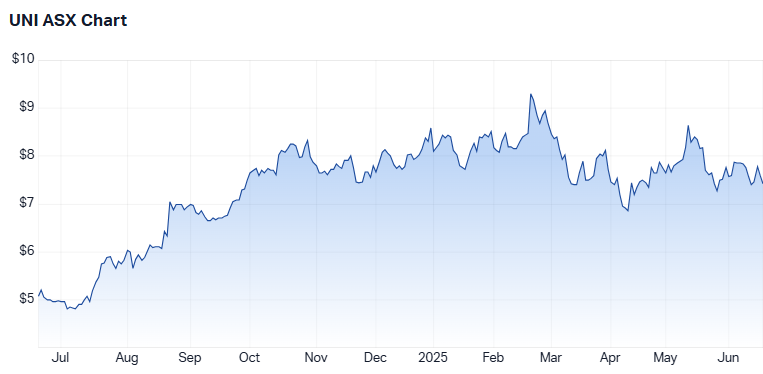
In February, management delivered a strong set of results: double-digit sales growth, gross margins north of 60%, and a $37.7 million net cash position. The company is targeting over 100 stores in the near term, building on its existing retail footprint.
UNI is hitting the right notes, is attractively valued, and pays a delectable fully-franked dividend. But it is in a sector where trends shift quickly.
#2. Ventia Services Group (ASX: VNT)
What it does: Ventia is one of the largest essential infrastructure services providers in Australia and New Zealand, operating in defence, transport, utilities, and telecommunications. It earns stable, recurring revenue from long-term government and corporate contracts.
Why it fits: A capital-light infrastructure play with earnings visibility, strong cash flow, and defensive sector exposure - without needing to own the physical assets.
Key metrics:
- Industry: Infrastructure services
- PE ratio: 18.57
- EPS growth (FWD): 15.4%
- Dividend yield: 4.2% (80% franked)
- Market cap: $4.13B
- Morningstar rating: Fairly valued
What’s happening with the stock: Who says infrastructure has to be boring? Ventia is on a tear - up over 30% in the past year and recently hitting record highs.
In May, Chair David Moffatt delivered a bullish outlook after the company posted more than 30% growth in both revenue and EBITDA over the past 12 months.
According to Moffatt, Ventia’s addressable market is set to grow 6.4% annually to over $100 billion by FY28. Today, it controls just $6 billion of an $83 billion share - leaving plenty of room to scale.
With strong tailwinds from population growth, urban expansion, and infrastructure demand - not to mention a modest PE, Ventia offers a compelling mix of value and growth, but ongoing execution to win and retain customers will be key.
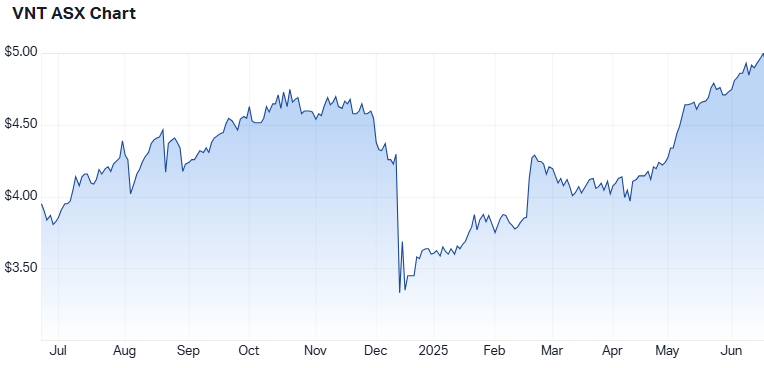
#3. Smartgroup Corporation (ASX: SIQ)
What it does: Smartgroup provides salary packaging, novated leasing, and workforce administration services mainly to government, health, and education sectors. It earns recurring income from long-term, low-churn clients.
Why it fits: A high-yield, defensive services business with strong cash flow and low cyclicality, well outside the tech and resource heavyweights.
Key metrics:
- Industry: Specialty business services
- PE ratio: 12.99
- EPS growth (FWD): 13.9%
- Dividend yield: 5.3% (100% franked)
- Market cap: $982M
- Morningstar rating: Undervalued
What’s happening with the stock: Smartgroup shares are down 13% over the past year, but the fundamentals are pointing up. At the recent Macquarie Australia Conference, the company pointed to a 10% average monthly revenue increase in the first quarter of 2025 from last year, driven by strong novated leasing settlements, record customer numbers, and a steadily rising return on equity approaching 30%.
With a PE of just 12.9 and a business underpinned by stable government contracts, Smartgroup looks to be trading at a meaningful discount. Be mindful, however, that this is a highly specialised business. Any changes to tax laws impacting novated leasing may leave Smartgroup looking... not so smart.
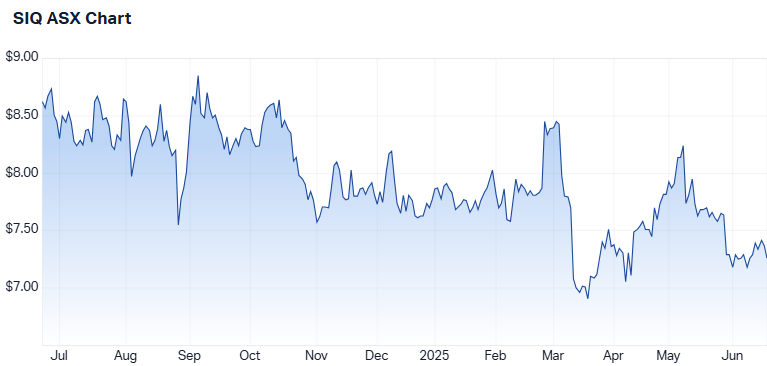
3 international diversifiers
To identify global companies that can meaningfully diversify a typical Australian portfolio, we leveraged data from FINVIZ applied a strict screen:
- Exclude banks, resources, technology and healthcare: These sectors are already well represented, understood or easily accessible for most Australian portfolios.
- Forward earnings per share (EPS) growth >10%: We want growth businesses, not value traps.
- Current PE ratio <20: To ensure we’re getting growth at a reasonable price.
- Market cap >$10 billion: We want the safety of large, reputable names.
- Pays a dividend: Foreign income still matters, especially for yield-focused investors.
- Consensus buy rating: Broad market support from analysts.
- Subjective test: Is a business like this - or of a similar scale - available in Australia? If the answer was yes, it didn’t make the cut.
#1. Canadian National Railway (NYSE: CNI/TSX: CNR)
What it does: CNR operates a gargantuan 32,000+ km freight rail network linking Canada’s Pacific and Atlantic coasts with the Gulf of America, forming a vital trade artery across North America. It hauls everything from grain and fertiliser to consumer goods. It's so integral to trade and getting goods to export markets that it has its own federally-authorised police force.
Why it fits: CNR provides exposure to essential transport infrastructure - at a scale and strategic importance that doesn’t exist on the ASX.

Key metrics:
- Industry: Logistics
- PE ratio: 19.50
- EPS growth (FWD): 10-15%
- Dividend yield: 2.54%
- Market cap: C$88.4B
What’s happening with the stock: CNR is down ~15% over the past year, despite guiding for 10–15% earnings growth. Trade tensions have weighed on sentiment, but the company has raised its dividend for 29 straight years. A trade deal could trigger a re-rate - this remains a pure play on a growing North American and global economy.
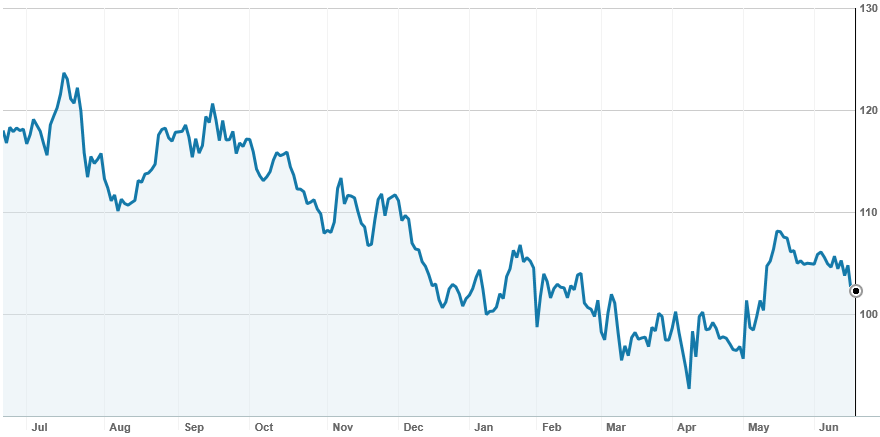
#2. CRH PLC (LSE: CRH/NYSE: CRH)
What it does: CRH is one of the world’s largest building materials companies, supplying cement, asphalt, and construction products across Europe and North America. It plays a critical role in building roads, bridges, commercial real estate, and public infrastructure.
Why it fits: Provides direct exposure to the global construction and infrastructure boom, an area without a true large-scale equivalent on the ASX, especially with Brickworks set to amalgamate with cornerstone investor Soul Patts.
Key metrics:
- Industry: Building materials
- PE ratio: 18.84
- EPS growth (FWD): 11%
- Dividend yield: 1.66%
- Market cap: US$60B
What’s happening with the stock: Despite macro uncertainty, CRH is a quiet outperformer - up 17% over the past year. It recently reaffirmed guidance for 6–12% core profit growth and $7.3–7.7 billion in EBITDA, while lifting its dividend by 6%. The company is riding a powerful tailwind of infrastructure spending, housing demand, and U.S. reshoring policies driving local construction.
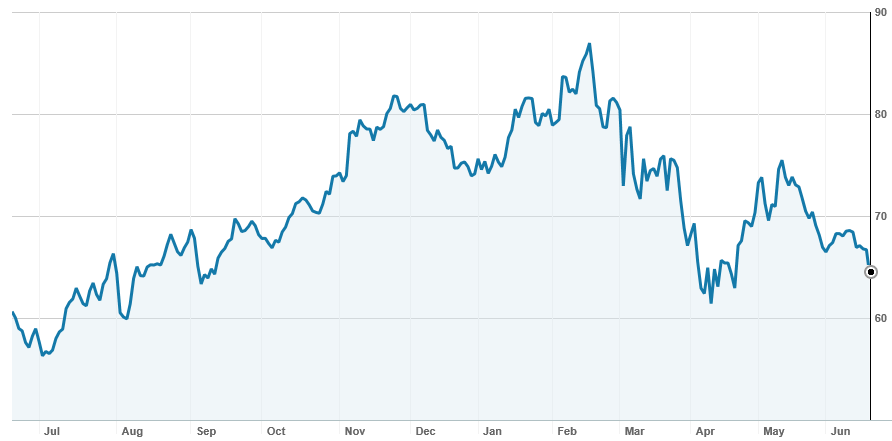
#3. Cummins Inc. (NYSE: CMI)
What it does: Cummins designs and manufactures diesel, natural gas, and hybrid engines used in trucks, buses, construction, and agricultural equipment. It's also expanding into hydrogen and electric powertrains as it positions for the clean energy transition.
Why it fits: A global industrial innovator with earnings power, dividend reliability, and energy transition exposure - none of which are easily found on the ASX.
Key metrics:
- Industry: Specialty industrial machinery
- PE ratio: 15.67
- EPS growth (FWD): 13.37%
- Dividend yield: 2.31%
- Market cap: US$43.37B
What’s happening with the stock: Cummins is up 15% over the past year and has nearly doubled over five - but it's down 10% year-to-date as investors weigh the impact of tariffs. While analysts remain optimistic about Cummins' EPS growth, management has withheld formal guidance due to ongoing trade tensions.
In its May earnings, Cummins reported record performance in its Power Systems division, with double-digit sales growth driven by surging demand from the booming data centre market.
With a modest valuation, a 15-year streak of dividend increases, and exposure to one of the market’s hottest themes through an industrial lens, Cummins could offer compelling value for investors seeking a well-run, growth-oriented business temporarily held back by external factors.
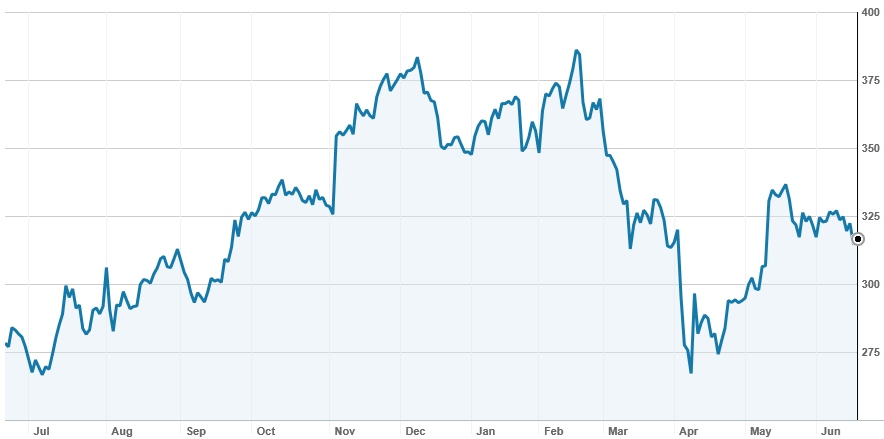
3 topics
6 stocks mentioned

